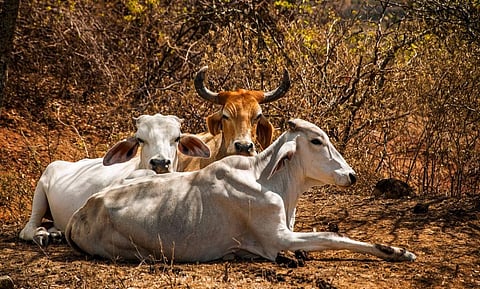

This is the second of a four-part series
During COVID-19, dairy farmers failed to get their animals inseminated at the correct time
Two researchers with the National Dairy Research Institute (NDRI), under the Indian Council of Agricultural Research (ICAR), describe how COVID-19 put the breaks on India’s artificial insemination programme.
In June 2020, soon after the nationwide lockdown in April-May 2020 was lifted, Gunjan Bhandari, scientist with NDRI, and Priyanka Lal, research scholar with the institute, conducted a small primary survey in 11 states to assess the impact of supply chain disruption on artificial insemination.
They found that the duration of the lockdown coincided with the favourable breeding season of bovines in India.
“Semen stations ran out of stock of frozen semen due to breakdown of supply chain. Dairy farmers failed to get their animals inseminated at the correct time either due to shortage of frozen semen or due to unavailability of AI (artificial insemination) technicians,” they write in the paper, Accounting the Unaccounted: The Hidden Losses of COVID-19 for Indian Dairy Sector, published on January 8, 2021 in Vigyan Varta, an international multi-disciplinary peer reviewed e-magazine.
Their findings show that farmers were not able to arrange artificial insemination service for around 34 per cent of breedable female bovines during the lockdown.
Even at a conservative estimate of 30 per cent, 2.07 million artificial inseminations would have been missed in April 2020, when India was experiencing a nationwide lockdown, they write.
Another study by ICAR-Indian Veterinary Research Institute, Izatnagar, Uttar Pradesh, published in Indian Journal of Animal Sciences in July 2021, states that 68 per cent farmers surveyed in the state faced constraints in accessing livestock services, such as artificial insemination, in April 2020 due to fear of COVID-19.
For every missed conception, farmer has to deal with milk loss, and also incur maintenance cost of the animal
Based on their survey, Bhandari and Lal have estimated the loss a dairy farmer can face in the event of a missed artificial insemination.
On the one hand, the farmer has to deal with milk loss and on the other they incur additional maintenance cost till the animal enters the next oestrus cycle, approximately after 21 days.
Thus, loss per missed (delayed) conception is equal to the sum of the value of milk loss till successful conception and the maintenance cost of the animal during the period, the authors write in the study paper.
Bhandari and Lal estimate that the total loss per missed conception in the country is Rs 7,948.50. “This amounts to a loss of Rs 824 crore at the national level in the month of April [2020],” they write.
There is a chance that during the lockdown, most of the farmers who failed to get artificial insemination services even during the next oestrus, might have opted for natural breeding service.
“Even if we assume that 80 per cent would have opted for natural service in May [2020], then still 20 per cent (414,909) AI [artificial insemination] would have been missed, which translates to 207,454 missed conception and a loss of Rs 165 crore loss in May,” the authors note.
Besides, replacement of artificial insemination by natural breeding service can affect the dairy economy for a longer period as an animal bred by random natural service has lower genetic potential.
“The average milk yield of calf born from naturally bred cow during its productive life is expected to be lower by 2 liters per day,” they say.
Now, do the maths to estimate the total milk loss because of the 16.84 million missed artificial insemination attempts.
Experts Down To Earth spoke to, however, suggest that such an estimation should be analysed on a larger population base and over a longer period of time to see its impact on the current cattle productivity.
This was first published as part of the cover story in the 16-31 August, 2023 print edtion of Down To Earth